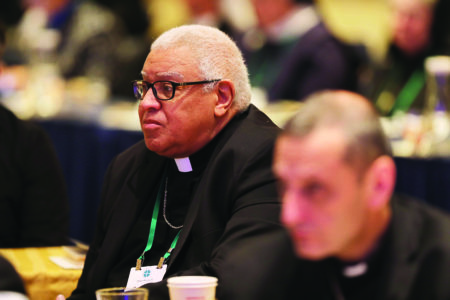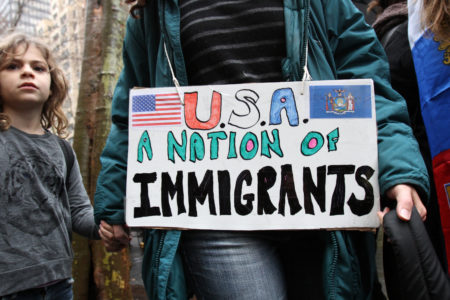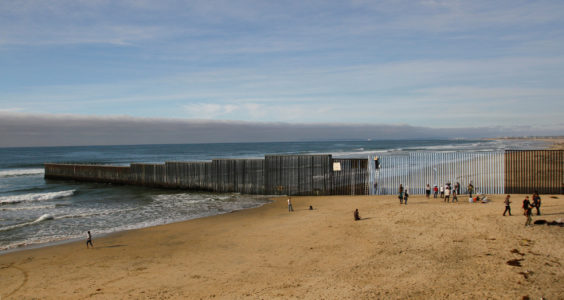Por Mark Pattison
BALTIMORE (CNS) – Una serie de estándares de responsabilidad episcopal para los obispos se presentó formalmente el 13 de noviembre en Baltimore, en la reunión general de otoño de la Conferencia de Obispos Católicos de EE. UU( USCCB, por sus siglas en ingles).

BALTIMORE – El obispo George V. Murry de Youngstown, Ohio, escucha el 12 de noviembre durante la asamblea general de otoño de la Conferencia de Obispos Católicos de los Estados Unidos en Baltimore. El obispo pidió a sus hermanos obispos que hicieran “un esfuerzo extra, dar un paso adicional para comunicarle a la gente que nosotros escuchamos lo que ellos tienen que decir”. (Foto CNS-Bob Roller)
Pero los estándares propuestos no se votaron pues el interés en discutirlos durante la sesión pública de la reunión del 14 de noviembre fue bajo. La intervención del Vaticano, anunciada cuando comenzó la reunión de la USCCB el 12 de noviembre, solicitó que los obispos no aprobaran ningún elemento de sus propuestas para fortalecer sus políticas sobre el abuso sexual por parte del clero, hasta que puedan ser revisados, para verificar su conformidad con el derecho canónico después de la reunión de febrero del Vaticano con los presidentes de las conferencias de obispos de todo el mundo.
“En nuestras diócesis, ya existen códigos de conducta”, dijo el cardenal Joseph W. Tobin de Newark, Nueva Jersey, presidente del Comité de Clero, Vida Consagrada y Vocaciones de la USCCB, el 13 de noviembre. “A la luz de eso, el enfoque se convirtió en cómo construir políticas adicionales y mejores prácticas para hacernos responsables “.
El obispo Steven R. Biegler de la Diócesis de Cheyenne, Wyoming, fue el único obispo que ofreció comentarios sobre los estándares propuestos. El obispo Biegler dijo que había experimentado de parte de feligreses, miembros de las fuerzas del orden público y de la comunidad legal que habían sido “muy críticos conmigo”, y agregaron que sienten “favoritismo hacia la persona que está en el poder … que luego evita a las víctimas”.
En los estándares hay un reconocimiento para que cada obispo firme “Como obispo, estoy llamado a imitar a Cristo, el Buen Pastor, lo más cerca posible, especialmente a su humildad. Estoy llamado a estar en medio de mi gente como uno que sirve”, y dice. “Por lo tanto, es mi compromiso solemne seguir estos Estándares de conducta episcopal y explorar continuamente e involucrar medios adicionales que protejan al pueblo de Dios y permitan que el Evangelio sea predicado con integridad”, y continua “Pido a todos los fieles que me apoyen en este compromiso y que recen por mí. El poder, el prestigio y los honores no pueden ser los deseos de un obispo; más bien, debe hacer lo correcto y lo que llevará a otros a la salvación”, dicen los estándares propuestos. “Los efectos del abuso de poder, especialmente en asuntos sexuales, han salido a la luz cada vez más. Reconocemos que algunos obispos no han logrado detener dicho abuso, o responder adecuadamente a tales afirmaciones, por lo que han hecho o han dejado de hacer”
“En nuestros códigos de conducta, si no están ya claramente establecidos, dejaremos en claro que el código se aplica al obispo de la diócesis o eparquía”, dicen los estándares propuestos. Agrega: “Los principios y estándares de la ‘Carta para la protección de niños y jóvenes’ se aplican a los obispos, a los sacerdotes y diáconos”.
Los estándares comprometen a los obispos a “continuar acercándose a las víctimas / sobrevivientes del abuso sexual del clero y a sus familias en apoyo de su bienestar espiritual y emocional. Al darnos cuenta de que es posible que no siempre seamos los más adecuados para ofrecer dicha atención, haremos todo lo posible para ayudar a las víctimas / sobrevivientes a encontrar el cuidado y la curación que necesitan “. La mala conducta sexual con un adulto por parte de un obispo dice el documento propuesto, “es gravemente pecaminosa; también podría ser un crimen canónico o civil. … los pecados contra el Sexto Mandamiento atentan contra la dignidad de una persona y no tienen absolutamente ningún lugar en la vida de un ministro, especialmente uno que es un obispo.”
“No puede haber una ‘doble vida’, no ‘circunstancias especiales’, no ‘una vida secreta’ que libere a un obispo de practicar la castidad. El obispo está llamado a la castidad y la continencia”, agrega.


